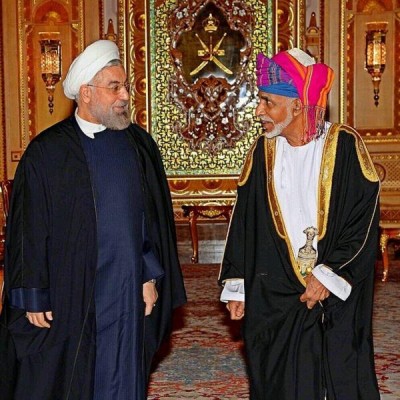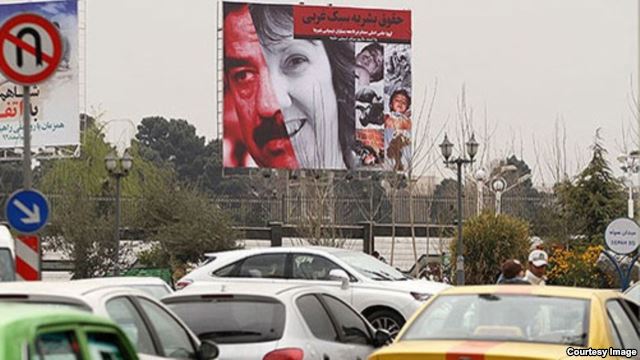LATEST: Student Activist Momeni Released After 5 Years in Prison
President Rouhani, pursuing his strategy of engagement of Gulf States, began two days of talks in Oman on Wednesday.
See Iran Feature: President Rouhani’s Trip to Oman
The statements from Rouhani’s discussions with Oman’s Sultan Qaboos were the standard cordial rhetoric praising good relations, but Iran outlet pointedly declared that they “can set the example for other countries in the region”.
Rouhani is seeking an accommodation with Saudi Arabia, which has long been in conflict with Iran over Syria, Iraq, and other regional issues. Sources say that, following back-channel contacts between former Iranian President Hassan Rafsanjani and Saudi King Abdullah, the Iranian President may visit Riyadh in April.
See Supreme Leader Approves Rafsanjani’s Back-Channel Talks With Saudi Arabia?
Iranian media briefly mentioned that Rouhani and Qaboo considered “the crisis in Syria” and the security of the Straits of Hormuz, as well as agreeing to expand cooperation in areas such as energy, shipping, customs, finance, tourism, and education.
More substantially, Oil Minister Bijan Zanganeh and Omani counterpart Mohammad bin Hamd Al Ramhi signed a 25-year contract, worth $60 billion, for exports of Iranian natural gas exports to Oman. The agreement also permits the marketing of Tehran’s natural gas by joint venture companies.
Student Activist Momeni Released After 5 Years in Prison
Student leader and activist Abdollah Momeni has been released after almost five years in prison.
Momeni was arrested during the mass protests after the disputed 2009 Presidential election. He was sentenced to eight years in prison for his “activities against national security”. Witnesses said he was abused in detention.
Momeni was awarded the 2009 Homo Homini Award by People in Need,sharing it with student activist Majid Tavakoli, who was arrested in December 2009 nand is still behind bars.
High-Level Officials Continue Attacks on Ashton Over Meeting with Women’s Rights Activists
For the third day in a row, senior Iranian officials have attacked the European Union’s Catherine Ashton, the lead nuclear negotiator for the 5+1 Powers, for her meeting with women’s rights activists in Tehran.
Ashton, in Iran for talks before high-level nuclear discussions resume in Vienna on Saturday, met the women in the Austrian Embassy. Participants included activist Narges Mohammadi, who was imprisoned for her work with the Center for Defenders of Human Rights, and the mother of blogger Sattar Beheshti, killed in detention in November 2012.
Judiciary head Sadegh Larijani warned the Rouhani Government on Wednesday that he will “begin action” if “such a trend continues”.
The head of Iran’s armed forces, General Hassan Firouzabadi, said, “If Ms. Ashton intends to (begin) another sedition in Iran, she will take this wish to the grave.”
A billboard in Tehran linked Ashton with one of Iran’s arch-enemies, the Iraqi leader Saddam Hussein.
Speaker of Parliament Ali Larijani, deputy head of armed forces Massoud Jazayeri, and senior MPs have also denounced the encounter with “seditionists”, and the Foreign Ministry has complained to the Austrian Embassy.
A group of “students” were mobilized on Wednesday to protest outside the Embassy.
Sadegh Larijani also joined the regime’s criticism of Ban Ki-Moon over the United Nations Secretary-General’s remarks about human rights and executions in Iran.
On Wednesday, the Supreme Leader’s senior advisor, Ali Akbar Velayati, chided Ban for “interfering in Iran’s internal affairs by supporting dissident leaders”.
The Secretary-General, reporting to the UN Human Rights Council, in which he urged President Rouhani “to consider the immediate release” of opposition leaders Mehdi Karroubi and Mir Hossein Mousavi.
Mousavi and Karroubi, both candidates in the disputed 2009 Presidential election, have been held under strict house arrest for more than three years.
Revolutionary Guards’ Newspaper Erases Mother of Slain Blogger from Photo with EU’s Ashton
As leading Iranian officials have criticized the European Union’s Catherine Ashton for meeting women’s right activists, the hardline Javan newspaper has tried another approach to downplay the encounter.
Javan, linked to the Revolutionary Guards doctored a photograph of the meeting to erase Gohar Eshghi, the mother of blogger Sattar Beheshti, killed in detention in November 2012.



